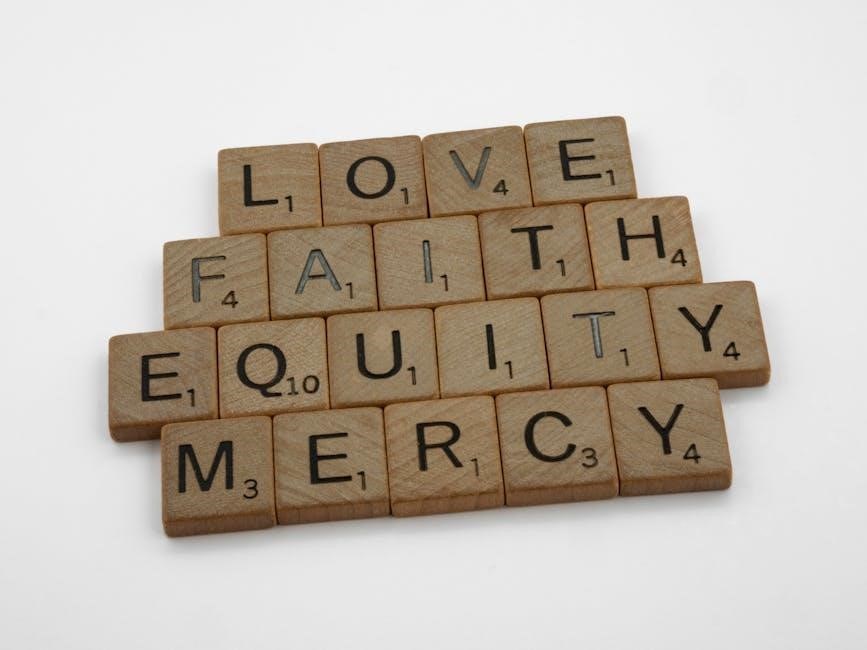Bryan Stevenson’s memoir, Just Mercy, uncovers the flaws in America’s justice system through heart-wrenching stories of wrongful convictions, racial inequality, and the fight for redemption. A must-read for understanding systemic injustice.
Overview of the Book
Just Mercy is a compelling memoir by Bryan Stevenson that delves into the deeply flawed American justice system. Through personal narratives and legal battles, Stevenson highlights the systemic inequalities faced by the poor, marginalized, and wrongly convicted. The book centers on the case of Walter McMillian, a Black man wrongly sentenced to death for a murder he did not commit; Stevenson’s advocacy for McMillian exposes the racial bias and corruption embedded in the legal system. Interwoven with other stories, such as those of Anthony Ray Hinton and Joe Sullivan, the memoir underscores the urgent need for reform; Stevenson’s work through the Equal Justice Initiative (EJI) is a testament to the power of empathy and resilience in the fight for justice. The book serves as both a critique of the criminal justice system and a call to action for mercy and redemption in a society often defined by punishment and inequality.
Bryan Stevenson’s Background
Bryan Stevenson is a renowned American lawyer, civil rights activist, and author. Born in Milton, Delaware, he grew up in a low-income community, which deeply influenced his commitment to social justice. Stevenson earned his law degree from Harvard Law School, where he became passionate about defending the rights of marginalized individuals. His journey into advocacy began with a focus on death row prisoners and wrongful convictions. In 1989, he founded the Equal Justice Initiative (EJI) in Montgomery, Alabama, dedicating his career to challenging racial and economic disparities in the criminal justice system. Stevenson’s work has earned him numerous awards, including the National Medal of Freedom, the highest civilian honor in the U.S. His memoir, Just Mercy, reflects his decades-long fight for justice and his belief in the transformative power of empathy and compassion.
The Founding of the Equal Justice Initiative (EJI)
In 1989, Bryan Stevenson established the Equal Justice Initiative (EJI) in Montgomery, Alabama, with a mission to combat systemic racial and economic inequality in the U.S. criminal justice system. Initially operating from a small office, EJI focused on providing legal representation to death row prisoners, many of whom were wrongly convicted or lacked adequate counsel. Stevenson’s vision was to challenge the death penalty and advocate for criminal justice reform. Over time, EJI expanded its scope to address mass incarceration, racial disparities, and the treatment of juvenile offenders. The organization’s work includes groundbreaking research, education, and advocacy efforts. EJI’s commitment to justice and human rights has made it a leading voice in the fight against systemic injustice, inspiring nationwide reforms and raising awareness about the need for a more equitable legal system.

Key Themes in “Just Mercy”
The memoir explores systemic injustice, racial disparities, and the power of mercy, highlighting the need for empathy in legal advocacy and the resilience of marginalized communities fighting for equality and redemption.
The Struggle for Justice in America
Bryan Stevenson’s Just Mercy vividly portrays the deep-seated inequities in America’s justice system, particularly for marginalized communities. The book highlights how systemic racism, poverty, and a lack of empathy perpetuate injustice. Stevenson’s work reveals how the legacy of slavery and Jim Crow continues to influence modern legal practices, disproportionately affecting Black Americans. Through cases like Walter McMillian’s wrongful conviction and Anthony Ray Hinton’s decades-long fight for exoneration, Stevenson exposes the flaws in a system that often prioritizes punishment over fairness. The memoir underscores the human cost of mass incarceration and the dehumanization of those trapped within it. Stevenson’s advocacy underscores the urgent need for reform and the importance of empathy in legal advocacy to address these systemic failures. His work challenges readers to confront uncomfortable truths about justice in America and to advocate for a more compassionate and equitable system. The struggle for justice remains ongoing.
The Power of Mercy and Redemption
Bryan Stevenson’s Just Mercy profoundly explores the transformative power of mercy and redemption within the criminal justice system. Stevenson argues that mercy is not a sign of weakness but a necessary component of a just society. Through the stories of clients like Walter McMillian and Anthony Ray Hinton, he illustrates how systemic injustice often denies individuals the opportunity for redemption. Stevenson’s work emphasizes that true justice cannot exist without acknowledging the humanity of those accused and convicted. The book shows how acts of mercy, such as fighting for the exoneration of the wrongfully convicted, can heal both the individual and society. Stevenson’s advocacy for sentencing reform, particularly for juveniles, highlights the need for a justice system that prioritizes rehabilitation over punishment. By sharing these stories, Stevenson challenges readers to reconsider their views on mercy and its role in fostering a more compassionate legal system. Redemption, he argues, is not just for the accused but for society itself.
The Role of Empathy in Legal Advocacy
In Just Mercy, Bryan Stevenson underscores the critical role of empathy in legal advocacy, emphasizing that understanding clients’ stories and struggles is essential for effective representation. Stevenson’s approach involves deeply connecting with his clients, listening to their experiences, and advocating not just for their legal rights but for their humanity. Empathy allows lawyers to see beyond the criminal record and recognize the systemic inequalities and personal hardships that shape their clients’ lives. By fostering trust and understanding, Stevenson demonstrates how empathy can bridge the gap between legal formalities and the moral imperative to fight for justice. This compassionate approach is particularly vital for marginalized communities, where empathy becomes a powerful tool for challenging systemic biases and advocating for fair treatment. Stevenson’s work shows that empathy is not merely a virtue but a necessary component of meaningful legal advocacy.
Systemic Injustice and Racial Disparities
Bryan Stevenson’s Just Mercy sheds light on the pervasive systemic injustice and racial disparities embedded in the American criminal justice system. Through his work with the Equal Justice Initiative, Stevenson exposes how centuries of racial discrimination, rooted in slavery and segregation, continue to influence legal outcomes for marginalized communities. The book highlights how people of color, particularly Black Americans, are disproportionately targeted by law enforcement, receive harsher sentences, and face greater barriers to fair legal representation. Cases like Walter McMillian’s wrongful conviction and Anthony Ray Hinton’s decades-long fight for exoneration illustrate the intersection of race and injustice. Stevenson argues that these disparities are not isolated incidents but rather symptoms of a deeply flawed system that perpetuates inequality. By connecting historical injustices to modern-day legal practices, Just Mercy challenges readers to confront the systemic racism that undermines fairness and equality in America. Stevenson’s work calls for urgent reform to address these entrenched inequities.

Notable Cases Highlighted in the Book
Just Mercy details cases like Walter McMillian’s wrongful conviction, Anthony Ray Hinton’s decades-long fight for exoneration, and Joe Sullivan’s harsh sentencing as a juvenile, exposing systemic injustice and racial disparities in the legal system.
Walter McMillian’s Wrongful Conviction

Walter McMillian, a Black man, was wrongly convicted of murdering a young white woman in Monroeville, Alabama, in the late 1980s. Despite a lack of physical evidence, McMillian was sentenced to death, largely due to questionable eyewitness testimony and racial bias in the community. Bryan Stevenson, through the Equal Justice Initiative (EJI), took on McMillian’s case, uncovering significant evidence that proved his innocence, including alibis and witness recantations. The prosecution had withheld key evidence that could have exonerated McMillian, highlighting systemic injustice. Stevenson’s relentless advocacy eventually led to McMillian’s exoneration after years on death row. This case underscores the deep racial disparities and flawed legal processes that permeate America’s justice system, as detailed in Just Mercy.
Anthony Ray Hinton’s Fight for Exoneration
Anthony Ray Hinton, a Black man, was wrongly convicted of two murders in Alabama during the 1980s. Despite a lack of physical evidence linking him to the crimes, Hinton was sentenced to death, largely due to faulty forensic testimony and racial bias. Bryan Stevenson and the Equal Justice Initiative (EJI) took on Hinton’s case, revealing that the state’s key evidence—a revolver allegedly matching the crime—was unreliable. Stevenson argued that Hinton’s low intelligence and limited resources made him an easy target for overzealous prosecutors. After 12 years on death row, Hinton was exonerated when a court finally acknowledged the flaws in the evidence. His story, vividly recounted in Just Mercy, highlights the systemic failures that allow innocent people to be condemned, emphasizing the urgent need for reform and the importance of empathy in legal advocacy.

Joe Sullivan’s Case and Juvenile Justice

Joe Sullivan’s case, highlighted in Just Mercy, exposes the harsh realities of juvenile justice in America. At just 12 years old, Sullivan was sentenced to life without parole for a non-homicide offense, a decision that reflects the criminal justice system’s failure to consider the unique circumstances of juvenile offenders. While incarcerated, Sullivan faced severe abuse, including multiple instances of sexual assault, which further underscored his vulnerability and the system’s inability to protect him. Bryan Stevenson and the Equal Justice Initiative (EJI) advocate for Sullivan, arguing that life sentences for children violate fundamental principles of justice and human rights. Sullivan’s story illustrates the long-term consequences of punitive measures against minors and the urgent need for reforms that prioritize rehabilitation over punishment. His case serves as a powerful reminder of the systemic injustices faced by juvenile offenders and the importance of advocating for their rights and dignity.

The Impact of “Just Mercy”

Just Mercy has sparked widespread dialogue on racial injustice and mass incarceration, inspiring legal reforms and raising public awareness about systemic disparities in the U.S. justice system.
Public Reception and Reviews
Just Mercy has received widespread critical acclaim for its raw portrayal of systemic injustice. Reviewers praise Stevenson’s storytelling, calling it a powerful exposé of America’s flawed justice system. The book became a New York Times bestseller and earned high praise from legal experts and general readers alike. Many reviewers highlighted its emotional depth, noting how Stevenson’s personal journey and his clients’ struggles evoke both outrage and hope. The memoir has also been adapted into a film, further amplifying its message. Audiences and critics alike have lauded the book for its ability to humanize those caught in the criminal justice system. Its impact extends beyond literature, sparking conversations about race, mercy, and redemption. The book’s unflinching honesty has made it a pivotal work in the national dialogue on justice reform.
Legal and Social Reforms Inspired by the Book
Just Mercy has sparked significant legal and social reforms, particularly in addressing wrongful convictions and racial disparities. The book’s exposure of systemic injustices has led to renewed efforts to reform the U.S. criminal justice system. Advocacy groups, inspired by Stevenson’s work, have pushed for policies to end mass incarceration and improve legal representation for the poor. The Equal Justice Initiative, founded by Stevenson, has successfully exonerated numerous death row inmates, highlighting the need for broader reforms. The memoir has also influenced public opinion, leading to increased support for legislation aimed at reducing racial bias in sentencing and improving juvenile justice systems. By shedding light on these issues, Just Mercy has become a catalyst for change, inspiring lawmakers and citizens alike to address the deep-rooted flaws in America’s justice system.
The Book’s Role in Raising Awareness About Injustice
Just Mercy has played a pivotal role in raising awareness about systemic injustice, particularly racial and economic disparities in the U.S. criminal justice system. By sharing personal stories of wrongful convictions, Bryan Stevenson humanizes the struggles of marginalized communities, making the abstract concepts of injustice relatable to a broad audience. The book has sparked widespread conversations about mass incarceration, the death penalty, and the treatment of the poor and people of color. Stevenson’s narrative has inspired readers to engage with these issues, fostering empathy and urgency for reform. The memoir’s accessibility and emotional depth have made it a powerful tool for educating the public about the flaws in the justice system. As a result, Just Mercy has become a cornerstone in discussions about inequality and has motivated many to advocate for systemic change. Its impact extends beyond literature, influencing public perception and inspiring action to address these injustices.
Just Mercy is a profound exploration of justice, humanity, and redemption. Stevenson’s work challenges readers to confront systemic inequality and advocate for a more compassionate and equitable society. His legacy continues to inspire change.
Final Thoughts on Justice and Redemption
Bryan Stevenson’s Just Mercy leaves readers with a profound reflection on justice, humanity, and redemption. Through his work with the Equal Justice Initiative, Stevenson underscores the urgent need for compassion and fairness in a flawed criminal justice system. The book highlights how systemic inequality disproportionately affects marginalized communities, emphasizing the importance of empathy and understanding in legal advocacy. Stevenson’s journey, marked by both triumphs and heartbreaks, serves as a powerful reminder of the resilience of the human spirit and the enduring fight for justice. Ultimately, Just Mercy challenges readers to confront uncomfortable truths about inequality and inspire meaningful change. Stevenson’s work not only seeks to redeem the lives of his clients but also to transform a system that often fails to deliver true justice. His story is a testament to the power of unwavering dedication and the enduring hope for a more just society.

The Ongoing Fight for Equality in the Justice System

Just Mercy underscores the persistent struggle for equality in America’s justice system, highlighting systemic racial biases and the disproportionate impact of mass incarceration on marginalized communities. Bryan Stevenson’s work with the Equal Justice Initiative reveals how deeply entrenched these inequalities are, particularly for Black Americans and the poor. The book emphasizes the need for continued advocacy and reform to address these disparities. Stevenson’s efforts to challenge wrongful convictions and harsh sentencing practices demonstrate the urgency of this fight. While progress has been made, the ongoing nature of these injustices calls for sustained commitment to creating a fairer system. The memoir serves as a powerful reminder that true equality in justice requires not only legal reforms but also a cultural shift toward empathy and understanding. Stevenson’s work inspires hope that, through relentless effort, a more equitable justice system is possible.
